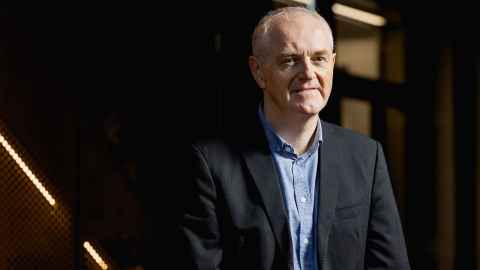Kiwi patient first in world to test new gene therapy
1 July 2024
The first person in the world has just been dosed in a New Zealand trial of a revolutionary new genetic therapy.

A New Zealander has just become the first patient in the world to be dosed in a trial of a revolutionary therapy that ‘silences’ the gene that causes their disabling condition known as ‘FSHD’.
There are around 130 people in New Zealand with facioscapulohumeral muscular dystrophy (FSHD), a hereditary disorder that usually starts in childhood and causes weakness in muscles, primarily in the face, shoulders and upper arms.
FSHD is caused by expression of a gene called DUX4 in the body. The drug being trialled targets muscle cells and ‘silences’ expression of the DUX4 gene, which causes havoc in the bodies of people with FSHD.
“What we're attempting to do is the job which the body is supposed to be doing by trying to suppress the expression of the DUX4 gene,” says principal investigator Associate Professor Richard Roxburgh of Waipapa Taumata Rau, University of Auckland.
“The young man who has just been dosed with the drug is like the first person to go to the moon,” Dr Roxburgh says.
“Because it is a genetic treatment, it is only possible to test the drug on someone who has that particular genetic disorder.
“They really are brave in taking on the study, but they already have to face decisions that others without the disease don’t have to make, on a daily basis” he says.
The first 16 patients will receive a single low dose of the new drug, called ARO-DUX4 and produced by genetic therapeutics company Arrowhead, or a placebo.
Four groups of four patients will be trialled on increasing doses, making sure each dose is safe before going to the next dose. These patients will be monitored for 90 days for adverse events.
If there are no reactions, a larger randomised-controlled trial will get under way, again based in New Zealand but other sites will join. These patients will be monitored for 360 days.
Then there will be further trials to assess the optimal safe dose of the drug. Find out more on the FSHD Society website.
This comes as patients from another ‘first in human’ trial of a genetic therapy for a more common neuromuscular disease, myotonic dystrophy, affecting around 300 New Zealanders, has produced results from the first six months. See original media release.
This trial of a Dyne genetic therapy, also led globally by the University of Auckland, is showing very positive results.
“It looks like it is really working and doing what we had hoped for,” Dr Roxburgh says.
“The patients are stronger and, most importantly, the underlying disease mechanism is being corrected and the higher the dose the more it is being corrected.”
The drug company is making plans for a final larger trial with the goal of the drug going to market in the next few years.
Dr Roxburgh will present on the early results at a major meeting, the International Congress of Neuromuscular Diseases in October 2024.
“It is a real privilege to present there, as there will be thousands of people attending from all over the world,” he says.
The key to New Zealand being the first country in the world to start these trials internationally, is Punaha Io – the New Zealand Neurogenetic Registry and Biobank, which facilitates contacting and recruiting patients, even with rare neurogenetic diseases like these, says programme manager Miriam Rodrigues.
It also helps that the University has strong connections with patient advocacy groups, as well as research partners at Te Toka Tumai Auckland Hospital and New Zealand Clinical Research centre in Auckland.
“These therapies are treating genetic disorders that have a huge impact on people’s lives.
“They don’t get the attention the likes of cancer therapies get, possibly because of the small numbers of people involved.
“But for these patients, the treatments are life-changing,” Dr Roxburgh says.
The University will join a further trial of a genetic therapy this year, Avidity, which is in the stages immediately preceding FDA approval to go to market.
These new genetic treatments are facilitated by research and technology developments worldwide that are transforming treatment of genetic diseases, Dr Roxburgh says.
“It’s exciting, because the therapies target the specific gene that is causing the disease, which is why we get so few off-target effects,” he says.
“It’s as significant as having antibiotics versus not having antibiotics.”
These are among an array of genetic research projects across the University aimed at transforming treatment of people with a variety of illnesses at all stages of life.
Media contact
FMHS media adviser Jodi Yeats
M: 027 202 6372
E: jodi.yeats@auckland.ac.nz